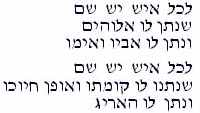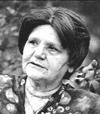Music and Texts of GARY BACHLUND
Vocal Music | Piano | Organ | Chamber Music | Orchestral | Articles and Commentary | Poems and Stories | Miscellany | FAQs
L'chol Ish Yeish Shem - (1992)
(
)
Zelda Mishkowsky
for medium high voice and organfor Aaron Gleason, on the occasion of his Bar Mitzvah
Each man has a name given by God and given by a mother and a father. Each man has a name given by stature and by demeanor, and given by a manner of dressing. Each man has a name....
This text remains under copyright and is therefore not fully reproduced herein.
The poem itemizes in the repetitive form of a litany the sentiment that "each man has a name," the translation of the title and first line of the poem. Each man has a name - which she informs is truly a reputation, or as the Talmudic expression conveys, the name becomes "the crown of a good name" - given by God, by parents, by demeanor and smile, by clothing, by mountains and walls, by planets, and eventually by death.
Zelda Mishkowsky
Zelda Shneurson Mishkowsky (1916 - 1984) was known to her readers simply as Zelda. Born into a famous Chassidic family in the Ukraine, her father was an Orthodox rabbi and her mother was well-read in modern Hebrew, Russian, and European literature. They immigrated to Jerusalem in 1926. Zelda studied at a religious school for girls and then at a teacher's seminary, thereafter studied art and painting in Tel Aviv, and later worked as teacher with handicapped children in Haifa. After her husband's death she returned to Jerusalem and taught, retiring after almost 50 years.
She began writing poetry as a teenager but publishing beginning only in 1968. Awarded the Bialik Prize, she published six volumes during her lifetime, with a complete collection published posthumously. Known for directness and simplicity, her symbolic language is steeped in traditional and Chassidic references. Her use of language was unusual. Author Amos Oz commented, "I loved the way... Zelda placed word next to word. Sometimes she placed one ordinary, everyday word next to another, equally routine and common, and suddenly, in their being joined... it was as though suddenly an electric current ran between them, exciting my spirit, which sought the wonders of words."
A fine translation as well as the original Hebrew are found in Hebrew Verse, ed. and trans. by T. Carmi, Penguin Books, 1981.

